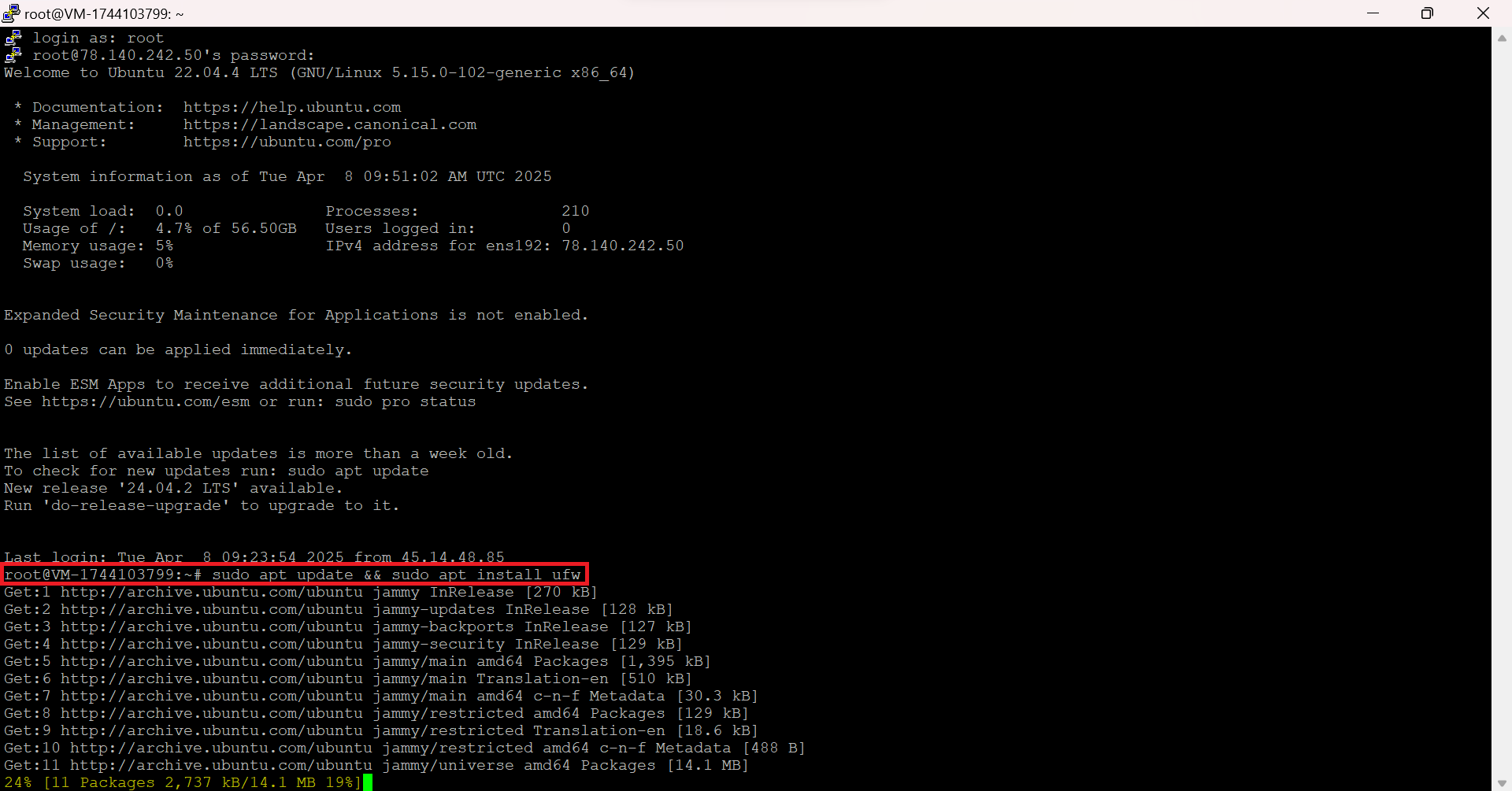Introduction
This guide explains how to configure and manage UFW (Uncomplicated Firewall) on Ubuntu servers. You will learn how to enable the firewall, create and delete rules, manage service profiles, and secure both IPv4 and IPv6 network traffic.
sudo apt update && sudo apt install ufw
Checking UFW Firewall Status on Ubuntu
To check whether the firewall is active:
sudo ufw statusIf you see Status: inactive, it means the firewall is currently disabled.

Enabling UFW
To enable UFW:
sudo ufw allow OpenSSHsudo ufw enable
To see the list of current rules:
sudo ufw status verbose
Disabling UFW
To temporarily disable the firewall:
sudo ufw disableNote: This completely turns off your firewall—use with caution!

Blocking IP Addresses and Subnets
- Block a specific IP:
sudo ufw deny from 91.198.174.190 - Block an entire subnet:
sudo ufw deny from 91.198.174.0/24 - Block an IP on a specific interface:
sudo ufw deny in on eth0 from 91.198.174.192 Allowing IP Addresses
- Allow all traffic from a specific IP:
sudo ufw allow from 91.198.174.192 - Allow incoming traffic from an IP on a specific interface:
sudo ufw allow in on eth0 from 91.198.174.22 Deleting Rules
- Delete a rule by its parameters:
sudo ufw delete allow from 91.198.174.192 - Delete a rule by number:
sudo ufw status numbered sudo ufw delete 1 Application Profiles
UFW can use predefined profiles for common services:
- List available profiles:
sudo ufw app list - Enable a profile (e.g. OpenSSH):
sudo ufw allow OpenSSH - Remove a profile:
sudo ufw delete allow "Nginx Full" 
Opening Common Ports
- SSH (port 22):
sudo ufw allow 22 - HTTP (port 80):
sudo ufw allow http - HTTPS (port 443):
sudo ufw allow https - HTTP + HTTPS combined:
sudo ufw allow proto tcp from any to any port 80,443 Allowing Database Connections
- MySQL (port 3306):
sudo ufw allow from 91.198.174.33 to any port 3306 - PostgreSQL (port 5432):
sudo ufw allow from 91.198.174.33 to any port 5432 - Allow for a subnet:
sudo ufw allow from 91.198.174.0/24 to any port 3306 FAQ: UFW (Uncomplicated Firewall) on Ubuntu
- Q1: How can I check which UFW rules are currently applied?
A1: Run the command:sudo ufw status verboseThis shows all active rules, including allowed ports and IP addresses.
- Q2: What if I accidentally block SSH access?
A2: Use your hosting provider’s console or IPMI/KVM access, then run:sudo ufw allow OpenSSHThis restores SSH connectivity safely.
- Q3: Can I allow multiple ports at once?
A3: Yes. For example, to allow HTTP and HTTPS together:sudo ufw allow proto tcp from any to any port 80,443You can adjust the ports as needed for your services.
- Q4: How do I remove a UFW rule I added by mistake?
A4: First, list rules with numbers:sudo ufw status numberedThen delete the unwanted rule by its number:
sudo ufw delete <rule_number> - Q5: What should I do if UFW conflicts with another firewall?
A5: Disable the other firewall (e.g., firewalld) or ensure it’s not managing the same ports and rules to avoid conflicts. - Q6: Can UFW manage both IPv4 and IPv6 traffic?
A6: Yes. UFW handles IPv4 and IPv6 simultaneously if configured in /etc/default/ufw by setting IPV6=yes.
UFW Best Practices for Ubuntu Servers
Best practices include allowing SSH before enabling UFW, restricting database access to trusted IPs, enabling IPv6 support, and periodically auditing firewall rules.
Conclusion
Configuring UFW on Ubuntu provides a simple and effective way to secure servers by controlling incoming and outgoing network traffic. UFW abstracts complex iptables rules, making firewall management accessible without sacrificing flexibility.
By carefully allowing essential services such as SSH, HTTP, HTTPS, and databases, and regularly reviewing firewall rules, administrators can significantly reduce attack surfaces and maintain a secure Ubuntu environment.




